北京外国语大学法学院国际经济法习题.doc
法学:国际经济法考试考试题.doc
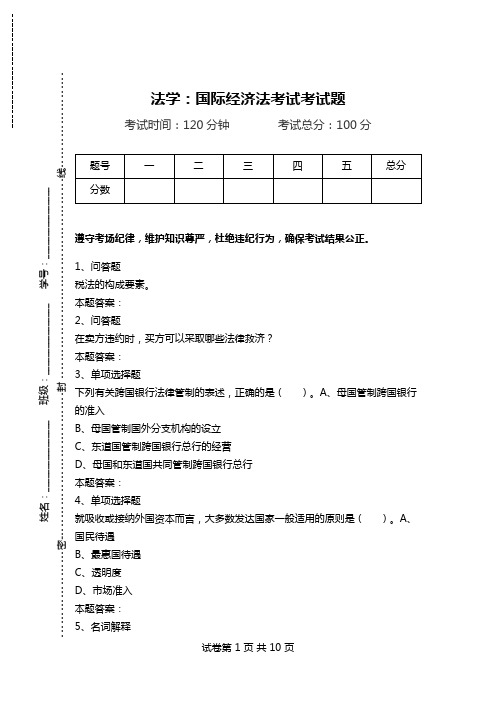
法学:国际经济法考试考试题 考试时间:120分钟 考试总分:100分遵守考场纪律,维护知识尊严,杜绝违纪行为,确保考试结果公正。
1、问答题 税法的构成要素。
本题答案: 2、问答题 在卖方违约时,买方可以采取哪些法律救济? 本题答案: 3、单项选择题 下列有关跨国银行法律管制的表述,正确的是( )。
A 、母国管制跨国银行的准入 B 、母国管制国外分支机构的设立 C 、东道国管制跨国银行总行的经营 D 、母国和东道国共同管制跨国银行总行 本题答案: 4、单项选择题 就吸收或接纳外国资本而言,大多数发达国家一般适用的原则是( )。
A 、国民待遇 B 、最惠国待遇 C 、透明度 D 、市场准入 本题答案: 5、名词解释姓名:________________ 班级:________________ 学号:________________--------------------密----------------------------------封 ----------------------------------------------线----------------------先期违约本题答案:6、名词解释国际重叠征税本题答案:7、名词解释跨国纳税人本题答案:8、单项选择题不清洁提单是指单据上附有声明货物及(或)包装有缺陷的附加条文或批注的提单。
那么注明()的是不清洁提单。
A.对货物质量或包装情况的客观描述,未表示有不满意的情况B.承运人对货物的内容、数量、质量、特性等不详C.承运人对包装或货物特性引起的损失概不负责D.外包装有油渍和水渍本题答案:9、名词解释预算本题答案:10、名词解释财政法本题答案:11、名词解释根本违约本题答案:12、名词解释国际逃税本题答案:13、单项选择题二战后国际货币法律制度产生的依据是()。
A、华盛顿公约B、国际货币基金协定C、国际复兴开发银行协定D、牙买加协定本题答案:14、多项选择题按宏观经济调控下分类的价格体系包括()。
国际经济法1答案全.docx

国际经济法第一次作业一、单项选择题( 每题只有一个正确答案,多选或少选、错选均不得分,每题1分,共1 0 分)1. 泰国A公司向法国B公司出口一批泰国香米,双方签订CIF合同。
在约定的装船日期,A公司将符合合同要求的香米装船并及时投保,但在海上航行途中由于海浪过大,大米被海水漫泡,质量降低。
应承担这批货物损失的是(C )A. A公司B.承运人C.B公司D.保险公司2. 依据1 980 年《联合国国际货物买卖合同公约》的规定,下列情形中,不能适用该公约的是(B )A. 营业地分处法国和加拿大的甲、乙二公司签订了2 0 0 0 吨材钢买卖合同,据查,甲、乙二公司的注册地均为美国B. 我国某造船厂与挪威国家石油公司签订买卖一艘万吨油轮的合同C. 我国某国有大型电机厂将6百万千瓦发电机卖给澳大利亚某电站D. 我国某知名电冰箱厂与同属缔约国成员的利比亚某公司签订的销售10 0 0 0台冰箱的合同3. 依据《跟单信用证统一惯例? ,银行可拒绝付款的情况是(D )A. 卖方所交付的货物数量和质量均不符合合同的规定,但与信用证要求相符B. 货物由于卖方的迟延履行而发生腐烂现象C. 买方没有收到货物D. 信用证与提单不符4 .甲国A公司(买方)与乙国B公司(卖方)签订一进口水果合同,价格条件为CFR,装运港的检验证书作为议付货款的依据,但约定买方在目的港有复验权。
货物在装运港检验合格后交由C公司运输。
由于乙国当时发生疫情,船舶到达甲国目的港外时,甲国有关当局对船舶进行了熏蒸消毒,该工作进行了数天。
之后,A公司在目的港复验时发现该批水果已全部腐烂。
依据《海牙规则》及有关国际公约,下列选项正确的是(C )A. A 公司应向B 公司提出索赔,因为其提供的货物与合同不符B. C 公司可以免责C. A公司应向C公司提出索赔,因为其没有尽到保管货物的责任D,A 公司应向B 公司提出索赔,因为其没有履行适当安排保险的义务5. 海上货物运输保险合同保险人常用的责任期间是(A )A. 仓至仓B. 舷到舷C.钩到钩D.门到门6. 美国某公司与法国某公司签订进口货物的合同,货物抵达目的港后,美国公司发现部分货物因受雨淋已经霉变,而且该批货物在途中还发生了共同海损。
北京外国语大学法学院

北京外国语大学法学院国际经济法教学参考文献与法规目录1、[德]E—U彼得斯曼,何志鹏、孙璐、王彦志等译著:《国际经济法的宪法功能与宪法问题》,高等教育出版社2004年版。
2、[法]克洛德·科隆贝:《世界各国著作权和邻接权的基本原则》,上海外语教育出版社1995年版。
3、[美]John H.Jackson:《关贸总协定和世贸组织的法理》(第二版),高等教育出版社2003年版。
4、[美]拉尔夫.H.费尔瑟姆、迈克.W戈登、约翰.A.史帕诺戈:《贸易与投资》,法律出版社2004年版。
5、[美]理查德·A·波斯纳:《法律的经济分析》,中国大百科全书出版社2002年版6、[美]米歇尔.E.波特:《国家竞争优势》,李明轩、邱如美译,华夏出版社2002年版。
7、[英]Clifford Chance法律公司:《项目融资》,华夏出版社1997年版。
8、[英]埃利斯代尔·克拉克著:《产品责任》,社会科学文献出版社1992年版。
9、[英]弗瑞迪·萨林格著:《保理法律与实务》,对外经济贸易大学出版社1995年版。
10、[英]施米托夫著,赵秀文选译:《国际贸易法文选》,中国大百科全书出版社1993年版。
11、[英]施米托夫著:《出口贸易——国际贸易的法律与实务》,对外贸易教育出版社1985年版12、[英]马克·霍伊著:《国际贸易法》,法律出版社1992年版。
13、[英] MICHAEL BRIDGE著:《国际货物销售法律与实务》,法律出版社2003年版。
14、陈安主编:《国际投资争端案例精选》,复旦大学出版社2001年版。
15、陈安主编:《国际投资争端仲裁——“解决投资争端国际中心”机制研究》,复旦大学出版社2001年版。
16、菲利普·伍德:《国际金融实务与法律》,何美欢译,香港商务印书馆1993年版。
17、高尔森主编:《国际税法》,法律出版社1992年版。
大学《国际经济法学》试题库及答案
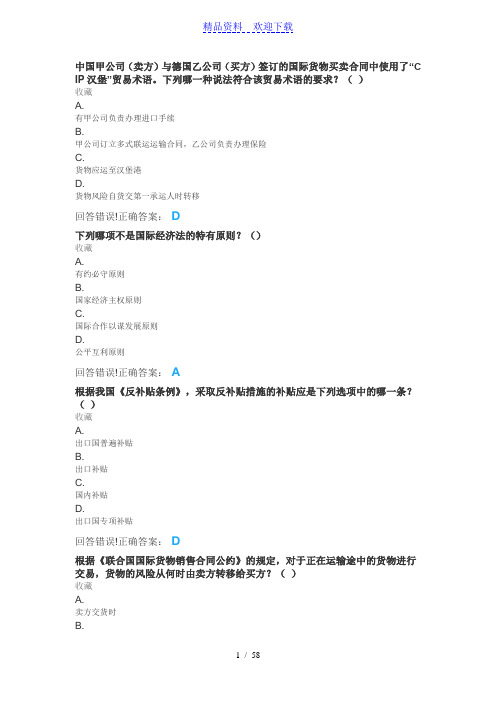
中国甲公司(卖方)与德国乙公司(买方)签订的国际货物买卖合同中使用了“C IP汉堡”贸易术语。
下列哪一种说法符合该贸易术语的要求?()收藏A.有甲公司负责办理进口手续B.甲公司订立多式联运运输合同,乙公司负责办理保险C.货物应运至汉堡港D.货物风险自货交第一承运人时转移回答错误!正确答案: D下列哪项不是国际经济法的特有原则?()收藏A.有约必守原则B.国家经济主权原则C.国际合作以谋发展原则D.公平互利原则回答错误!正确答案: A根据我国《反补贴条例》,采取反补贴措施的补贴应是下列选项中的哪一条?()收藏A.出口国普遍补贴B.出口补贴C.国内补贴D.出口国专项补贴回答错误!正确答案: D根据《联合国国际货物销售合同公约》的规定,对于正在运输途中的货物进行交易,货物的风险从何时由卖方转移给买方?()收藏A.卖方交货时B.双方约定的时间C.买方收取货物时D.合同成立时回答错误!正确答案: D国际银团贷款可以分为直接参与型与( )两种形式。
收藏A.转让型B.间接参与型C.匿名代理型D.代理银行指定型回答错误!正确答案: B制造单位的技术人员应该全面熟悉供方提供的( )。
收藏A.专利号B.技术资料C.信息D.科技报告回答错误!正确答案: B香港汇丰银行与中国建设银行在中国大陆根据中国外商投资立法合资举办了一家银行,其中香港汇丰银行所占股本为51%。
下述说法中正确的是()收藏A.该合资银行是中国银行业的组成部分,提供境内服务B.该合资分行提供的服务是通过跨境提供方式提供的C.按照中国相关法律,该合资银行属于外国法人D.该合资银行尽管是中国法人,提供的却是外国服务,是外国服务提供商回答错误!正确答案: D保护文学艺术作品伯尔尼公约》是著作权领域第一个世界性多边国际条约,也是至今影响最大的著作权公约。
下列关于该公约的说法哪一个是不正确的?()收藏A.该公约采用自动保护原则B.非成员国国民的作品在成员国首次发表可以受到公约的保护C.该公约不保护演绎作品D.该公约保护作者的经济权利回答错误!正确答案: C正式确立各国对本国境内的自然资源享有永久主权这一国际经济法原则的法律文件是()收藏A.《关于自由开发自然资源和自然财富的权利的决议》B.《关于自然资源永久主权宣言》C.《建立国际经济新秩序宣言》D.《各国经济权利和义务宪章》回答错误!正确答案: B确定国际技术贸易中“国际性”标准是()。
国际经济法试题及解析

国际经济法试题一、单项选择题1.DES术语主要适用于:A.铁路运输B.公路运输C.海上运输及内河运输D.多式联运2.根据《2000年国际贸易术语解释通则》,贸易术语适用于哪类合同?A.买卖合同B.运输合同C.保险合同D.租船合同3.CFR和CIF这两种贸易术语只适用于:A.海运B.内河运输C.海运或内河运输D.所有运输方式4.在国际货物买卖中,卖方只将代表货物所有权的提单、发票等交到买方手中,以完成货物所有权转移的交货方式称为下列哪种方式?A.象征性交货B.目的港交货C.工厂交货D.实际交货5.我国某技术进出口公司与美国某公司签订一份由美方向中方销售一台精密仪器的合同,其中价格条件为DEQ INCOTERMS2000。
货物在按期装运后,途中遇大风浪致使船舶触礁,由于船身摇摆过于剧烈,导致该精密仪器严重损坏。
经检验,修理该仪器所需费用将超过该仪器原本价值。
其后,双方因货物发生的损失及运费等问题产生争议。
依《2000年国际贸易术语解释通则》的规定,应由谁来承担该仪器的损失?A.美国公司B.我国某技术进出口公司C.船东D.保险公司6.我国A公司向瑞典B公司发出传真:“购高级新闻纸2000吨,每吨38美元,CIF上海,1999年5月1日至5日装船。
”B公司回电称:“同意你方条件,但因北海风浪期未过,装船时间定为1999年5月10日。
”根据国际惯例,B公司的回电属于:A.承诺B.反要约C.交叉要约D.逾期承诺7.如果国际货物买卖合同的当事人其营业地所属国为《联合国国际货物销售合同公约》的缔约国,则当事人如何适用公约?A.应该部分适用公约B.必须不适用公约C.可以全部排除公约的适用D.应该全部适用公约8.甲商行向乙商行发出商函,愿以1万美元价格卖掉其文字处理设备,该商函于1999年9月9日发出,于1999年9月15日到达乙商行。
期间,乙商行风闻甲商行欲处理其文字设备,于1999年9月14日向甲商行发出商函表示愿意购进。
北外《经济法》
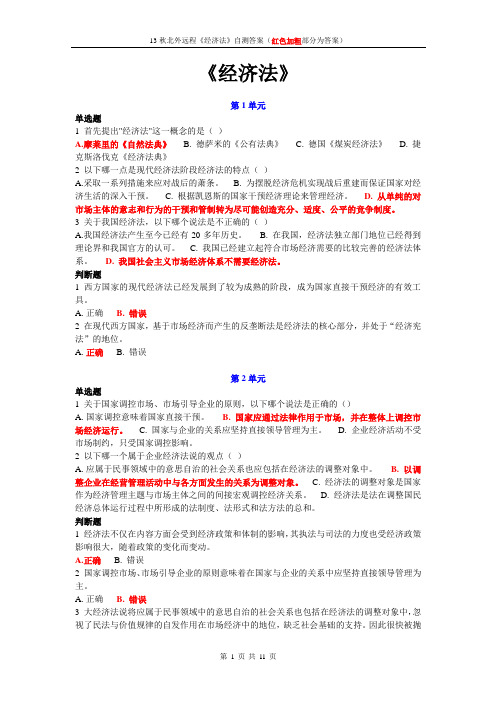
《经济法》第1单元单选题1 首先提出"经济法"这一概念的是()A.摩莱里的《自然法典》B. 德萨米的《公有法典》C. 德国《煤炭经济法》D. 捷克斯洛伐克《经济法典》2 以下哪一点是现代经济法阶段经济法的特点()A.采取一系列措施来应对战后的萧条。
B. 为摆脱经济危机实现战后重建而保证国家对经济生活的深入干预。
C. 根据凯恩斯的国家干预经济理论来管理经济。
D. 从单纯的对市场主体的意志和行为的干预和管制转为尽可能创造充分、适度、公平的竞争制度。
3 关于我国经济法,以下哪个说法是不正确的()A.我国经济法产生至今已经有20多年历史。
B. 在我国,经济法独立部门地位已经得到理论界和我国官方的认可。
C. 我国已经建立起符合市场经济需要的比较完善的经济法体系。
D. 我国社会主义市场经济体系不需要经济法。
判断题1 西方国家的现代经济法已经发展到了较为成熟的阶段,成为国家直接干预经济的有效工具。
A.正确B. 错误2 在现代西方国家,基于市场经济而产生的反垄断法是经济法的核心部分,并处于“经济宪法”的地位。
A.正确B. 错误第2单元单选题1 关于国家调控市场、市场引导企业的原则,以下哪个说法是正确的()A.国家调控意味着国家直接干预。
B. 国家应通过法律作用于市场,并在整体上调控市场经济运行。
C. 国家与企业的关系应坚持直接领导管理为主。
D. 企业经济活动不受市场制约,只受国家调控影响。
2 以下哪一个属于企业经济法说的观点()A.应属于民事领域中的意思自治的社会关系也应包括在经济法的调整对象中。
B. 以调整企业在经营管理活动中与各方面发生的关系为调整对象。
C. 经济法的调整对象是国家作为经济管理主题与市场主体之间的间接宏观调控经济关系。
D. 经济法是法在调整国民经济总体运行过程中所形成的法制度、法形式和法方法的总和。
判断题1 经济法不仅在内容方面会受到经济政策和体制的影响,其执法与司法的力度也受经济政策影响很大,随着政策的变化而变动。
国际经济法考试真题及答案(

一、单项选择题(在下面 A 、 B、 C、 D)四个选项中,选择正确答案,将相应的字母填在括号中。
每小题 1 分,共 10 分)1.《 2000 年国际贸易术语解释通则》中需买方自费办理出口结关手续的有A. EXW B . CIFC.DEQ D .FAS()2. 2000 年 6 月10 日,香港甲公司给厦门乙公司发出要约称:“螺纹钢1000吨,单价CIF厦门 250 美元/吨,合同订立后三个月装船,不可撤销即期信用证付款,请电复”。
厦门乙公司还盘:“接受你方发盘,在订立合同后请立即装船”。
对此香港甲公司没有回复,也一直没有装船。
厦门乙公司认为香港甲公司违约。
在此情形下,下列选项正确的是()A. 甲公司应于订立合同后立即装船 B .甲公司应于订立合同后三个月装船C.甲公司一直未装船是违约行为D.该合同没有成立3. 1980 年《联合国国际货物买卖合同公约》可以适用于(A. 确定合同的效力 B .确定买卖双方的风险承担)C.确定货物所有权的转移 D .确定产晶责任的承担4.《海牙规则》规定承运人对所运货物的责任期限为()A.从启运港至目的港的全部期间B.从货物装上船到货物交给收货人时止C.从货物装上船时起到货物卸下船时止D.从货物装上船到收货人检验完时止5.国际投资法调整的关系是()A.国家及国际经济组织之间的经济关系B.国际私人直接投资关系C.国际私人间接投资关系D.只涉及国际法规范关系6.香港某公司与我国某公司于2002 年3 月2 日签订买卖服装的合同, 3 月10 日货物出运, 4 月 1 日香港公司与瑞士公司签订合同将该批货物转卖,的港。
根据《联合国国际货物买卖合同公约》,该货物风险原则上在4 月(6 日货物到达指定目)转移至瑞士公司。
A.3 月 2日B.3月 10日C.4月1日D.4月 6日7.中国 A 公司要将其从美国 B 公司处通过普通许可合同购得的一项技术再许可给香港C 公司使用(原合同中有允许再许可的条款),A公司和 C 公司签订的合同只能是()A. 独占许可合同B.普通许可合同C.独家许可合同D.交叉许可合同8.下列损失中不属于中国人民保险公司海洋运输货物保险中平安险承保范围的是()A.被保险货物在运输途中由于自然灾害造成的货物的全部损失B.被保险货物在运输途中由于意外事故造成的货物的全部损失C.被保险货物在运输途中由于意外事故造成的货物的部分损失D.被保险货物在运输途中由于自然灾害造成的货物的部分损失9.开证行开出的信用证又经另一家银行担保付款的信用证属于()A 。
国际经济法答案(打印)

国际经济法答案一、名词解释:1、来源地税收管辖权:征税国基于作为课税对象的所得或财产系来源于或存在于本国境内的事实而主张行使的征税权,在所得税法上称为所得来源地税收管辖权,在财产税法上则称作财产所在地税收管辖权。
2、提单:提单适用于散杂货定期班轮运输,是国际海上货物运输中最广泛适用的一种合同形式。
3、共同海损:是指海上运输中,船舶、货物遭到共同危险,船方为了共同安全,有意和合理地作出特别牺牲或支出的特别费用。
4、国际货币基金组织:是根据1944年7月在美国布雷顿森林会议签订的《国际货币基金组织协定》,于1945年12月27日成立的。
其宗旨是:促进国际货币合作;促使国际贸易的扩大与平衡发展,以促进和维持高水平的就业和实际收入,以及会员国生产资源的发展;促进汇价稳定,维持会员国间有秩序的汇率安排,避免竞争性的外汇贬值;协助建立成员国间经常性交易的多边支付制度,并消除妨碍世界贸易发展的外汇管制;以及通过贷款调整成员国国际收支的暂时失衡。
5、国际重复征税:经济意义的国际重复征税,亦称为国际重叠征税或国际双层征税,是指两个以上的国家对不同的纳税人就同一课税对象或同一税源在同一期间内课征相同或类似性质的税收。
6、信用证:是指银行以本身的信誉向卖方提供付款信用与担保的一种方式。
7、国际货物多式联运:它是以至少两种不同的运输方式将货物从一国接管货物的地点运至另一国境内指定交付货物的地点。
8、扣除制:是指居住国在对居民纳税人的境内外所得征税时,允许居民纳税人从应税所得额中扣除在来源地国已缴纳的外国所得税额,就扣除后的余额计算征收所得税的制度。
9、居民税收管辖权:是征税国基于纳税人与征税国存在着居民身份关系的法律事实而主张行使的征税权。
10、直接投资:是指伴有企业经营管理权和控制权的投资,投资者在海外直接经营企业,并对企业的经营管理有较大的控制权。
11、根本违约:即违约合同的实质性约定,包括数量、质量、价款、履行时间、地点等。
国际经济法习题集

《国际经济法》习题集第一章国际经济法概述一、名词解释1.国际经济法2.国际经济关系3.国际经济法的地位4.国际经济法的范围5.交易权6.管理权7.经济主权8.国际条约9.国际惯例10.卡尔沃条款11.国家主权豁免12.消极行为二、简答题1.简述跨国公司的法律地位及其国际管制。
2.简述对有约必守原则的主要限制。
3.简述国际经济法律行为。
4.简述国家行为主义。
5.简述国际经济条约的“软约束”现象。
三、论述题1.试评析国际经济法概念多种学说,调整对象及特征。
2.试从国际经济法的产生与发展谈国际经济法渊源。
3.试论述国际经济法基本原则。
4.试论国际经济法律责任的构成要件的特点。
5.试论国际组织对国际经济法发展的作用。
6.试论国际经济法的基本原则。
第二章国际贸易法律制度一、名词解释1.国际贸易法2.发价3.还价4.接受5.溢短装条款6.价格术语7.关税8.反倾销9.普惠制10.数量限制措施11.提成支付12.技术回馈条款13.国际许可贸易14.国际特殊专营15.提单16.信用证17.国际服务贸易18.服务贸易总协定19.合同条件二、单项选择题1.关于D组贸易术语,下列选项哪个是正确?()A.DAF是在边境指定港口交货B.DES是在目的港船上交货C.DEQ是在目的港船上交货D.DDP和DDU术语下,货物的风险是在目的港交付时转移2.我国山东渤海公司与日本东洋株式会社在万国博览会上签订了一份由日方向中方提供BX2一Q船用设备的买卖合同。
其中价格条款为USD 832000/DES。
运输途中由于不可抗力导致船舶起火,虽经及时抢救,仍有部分设备烧坏。
之后双方就设备损失赔偿发生争议并申请仲裁。
你认为应由谁来承担烧坏设备的风险?( )A.东洋株式会社B.山东渤海公司C.船公司D.东洋株式会社和山东渤海公司依据公平原则各承担一半货物损失3.中国甲公司向法国乙公司出口一批中国大米,双方签订CIF合同。
在约定的装船日期,甲公司将符合合同要求的大米装船并及时投保了水渍险,但在海上航行途中由于海浪过大,大米被海水浸泡,质量降低。
国际经济法试题全文
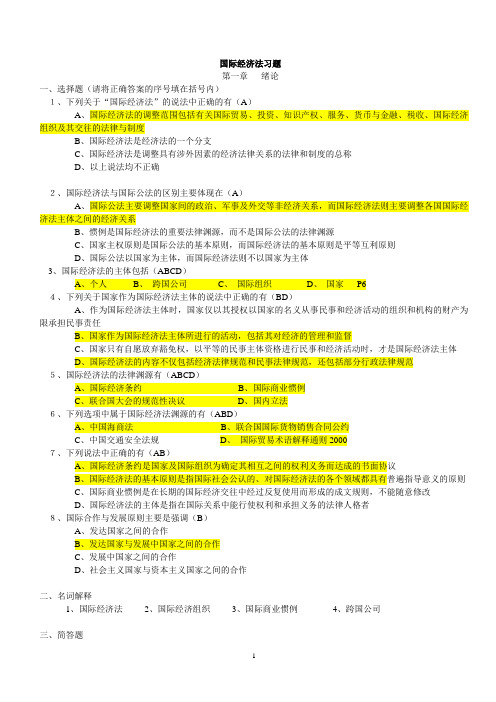
国际经济法习题第一章绪论一、选择题(请将正确答案的序号填在括号内)1、下列关于“国际经济法”的说法中正确的有(A)A、国际经济法的调整范围包括有关国际贸易、投资、知识产权、服务、货币与金融、税收、国际经济组织及其交往的法律与制度B、国际经济法是经济法的一个分支C、国际经济法是调整具有涉外因素的经济法律关系的法律和制度的总称D、以上说法均不正确2、国际经济法与国际公法的区别主要体现在(A)A、国际公法主要调整国家间的政治、军事及外交等非经济关系,而国际经济法则主要调整各国国际经济法主体之间的经济关系B、惯例是国际经济法的重要法律渊源,而不是国际公法的法律渊源C、国家主权原则是国际公法的基本原则,而国际经济法的基本原则是平等互利原则D、国际公法以国家为主体,而国际经济法则不以国家为主体3、国际经济法的主体包括(ABCD)A、个人B、跨国公司C、国际组织D、国家P64、下列关于国家作为国际经济法主体的说法中正确的有(BD)A、作为国际经济法主体时,国家仅以其授权以国家的名义从事民事和经济活动的组织和机构的财产为限承担民事责任B、国家作为国际经济法主体所进行的活动,包括其对经济的管理和监督C、国家只有自愿放弃豁免权,以平等的民事主体资格进行民事和经济活动时,才是国际经济法主体D、国际经济法的内容不仅包括经济法律规范和民事法律规范,还包括部分行政法律规范5、国际经济法的法律渊源有(ABCD)A、国际经济条约B、国际商业惯例C、联合国大会的规范性决议D、国内立法6、下列选项中属于国际经济法渊源的有(ABD)A、中国海商法B、联合国国际货物销售合同公约C、中国交通安全法规D、国际贸易术语解释通则20007、下列说法中正确的有(AB)A、国际经济条约是国家及国际组织为确定其相互之间的权利义务而达成的书面协议B、国际经济法的基本原则是指国际社会公认的、对国际经济法的各个领域都具有普遍指导意义的原则C、国际商业惯例是在长期的国际经济交往中经过反复使用而形成的成文规则,不能随意修改D、国际经济法的主体是指在国际关系中能行使权利和承担义务的法律人格者8、国际合作与发展原则主要是强调(B)A、发达国家之间的合作B、发达国家与发展中国家之间的合作C、发展中国家之间的合作D、社会主义国家与资本主义国家之间的合作二、名词解释1、国际经济法2、国际经济组织3、国际商业惯例4、跨国公司三、简答题1、简述国际经济法的概念与特征?2、国际经济法的调整范围主要有哪些?3、简要回答国际经济法产生的基础?4、国际经济法的主要渊源有哪些?5、简述国际经济法的基本原则?6、当今世界经济的三大支柱是哪些,其主要宗旨是什么?四、论述题1、试论述在法学界有关国际经济法的主要学说有哪些,其主要观点是什么?2、论国家作为国际经济法主体的法律地位。
大学国际经济法期末试卷系列-国际经济法期末AB卷及参考答案
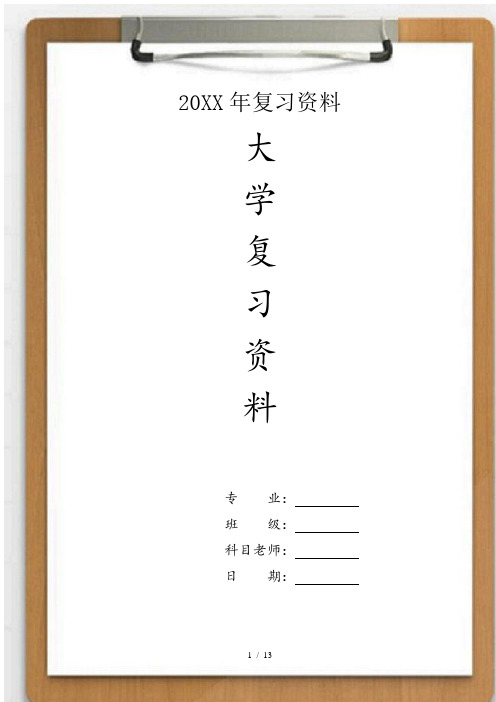
20XX年复习资料大学复习资料专业:班级:科目老师:日期:信息来源:法大BBS付姿祯搜集整理国际经济法概论(A卷)姓名___________所属学院及班级__________学号________授课教师________成绩_________一、名词解释(每题4分,共20XX分)1、国际经济法答案见P32、共同海损答案见P873、布雷顿森林体制答案见P2974、《巴黎公约》的临时性保护原则答案见P220XXXX5、税收饶让抵免答案见P420XXXX二、判断下列表述是否正确(在正确题后划√;错误题后划×,每题1分,共20XXXX分)(×)1、营业地在A国的卖方与营业地在B国的买方签订了买卖电器的合同,因为A 国和B国均为《联合国国际货物销售合同公约》的缔约国,因此,该进出口合同必须适用《联合国国际货物销售合同公约》。
(×)2、一成员违反WTO协议给另一成员造成损害引起争议,另一成员的对外贸易经营者可提请WTO争端解决机构解决。
(√)3、根据《20XXXX年国际贸易术语解释通则》,在EXW价格条件下,买方须自费办理货物的进口与出口手续。
(×)4、A与B签订国际许可合同,向B转让生产手机的专利使用权和专有技术使用权。
在该合同中,技术被许可方B应承担对受让的专利技术和专有技术的保密义务。
(√)5、因不可抗力的原因造成合同履行的阻碍,其法律后果可能是合同的解除,也可能是延迟履行。
(×)6、WTO的成员A颁布了新的外商投资法律,不允许外资投资于军用侦查卫星的开发。
A成员的做法违反了TRIMs。
(√)7、平等位次条款的作用主要在于当借款公司破产时,应保证所有的无担保债权人处于平等的受偿地位。
(√)8、布雷顿森林体制的实质是建立以美元为中心的国际货币体系。
(×)9、中国对外双边税收协定强调居民税收管辖权优先原则。
(×)20XXXX、各类保险公司均可以承保海外投资保险。
- 1、下载文档前请自行甄别文档内容的完整性,平台不提供额外的编辑、内容补充、找答案等附加服务。
- 2、"仅部分预览"的文档,不可在线预览部分如存在完整性等问题,可反馈申请退款(可完整预览的文档不适用该条件!)。
- 3、如文档侵犯您的权益,请联系客服反馈,我们会尽快为您处理(人工客服工作时间:9:00-18:30)。
北京外国语大学法学院国际经济法习题2007年9月Chapter One: Introduction to IEL1.Retell briefly the historical reasons and social motives that lead to the development ofinternational economic law.2.Retell briefly the international economic interdependence between nations before WWII and theinternational economic law during that period.3.Based on the new development of international economic law since WWII, give a description ofhow IEL would develop in the new century.4.Try to give 10 concrete examples of international public law, international private law,international economic law and international business practice. Conclude from the examples how these four behavioral laws/practices are similar to or different from IEL.5.Make a good sense of the realistic importance of studying IEL and relate to your responsibilitiesas an IEL student.Chapter Two: International Trade in Goods1.Hudson Mini-fridge Co. Ltd. Is one of the leading manufacturers of small refrigerators in Canada. The refrigerators are used primarily in hotels or motels as “minibars."Hudson of Churchill, Manitoba is the sole Canadian manufacturer of mini-refrigeratorMini-fridges are sold to hotels, recreation vehicle users and individuals through retail outlets. However, the hotel market is , by far, the largest user accounting for over 60 per cent of all mini-fridges sold in Canada. Hudson's entire output consists of mini-type refrigerators and is sold entirely for hotel use.The company was incorporated in 1982. The establishment of the company followed a feasibility study which indicated that the Canadian market had a potential of approximately 15,000 minibars per year in its 300,000 hotel/ motel rooms, 80,000 of which are found in 3-to 5- star hotels. At that time, although they were quite common in the European hotel industry, the minibars were relatively new products in Canada; the majority of minibars were being supplied by Electrolux ofWest Germany and Elektrosuisse of Italy, with a few being supplied from of “Antarctic"of Slovenia.Hudson was set up specifically to produce hotel mini-bars for the "MicroFRIG" franchise system” developed by MicroFRIG SpA of Italy Hudson purchases other certain parts from MicroFRIG with payment by Documentary Letter of Credit. Hudson purchases other components in Costa Rica with final assembly at its plant in Churchill.Hudson's major competitor is "Antarctic, "an exporter of Slovenian mini-refrigerators. Hudson has been noting a severe decline in sales in recent years and has come to suspect the “Antarctic” has been selling below what it actually costs to produces these goods in Slovenia. The special import Measures Act states that the production of like goods refers to those goods that are identical to the dumped goods, or, in the absence of identical goods, to those goods whose uses and other characteristics closely resemble those of the dumped goods. Admittedly, there are some minor differences in appearance and construction of the outer shell between the dumped and the domestically produced mini-fridges. The differences may render the two non-identical, but in the view of Hudson, they are certainly alike since both share their essential features, uses and characteristics.a.Antarctic does not have a sales office in Canada but an English language website that proudlywaves an animated Canadian flag. Payment is accepted in Canadian dollars. In addition, they have a toll-free number that rings in Slovenia and is answered by English-speakers duringnormal Canadian business hours. If the Sleep Easy Hotel in Ottawa orders 100 mini-refrigerators from Slovenia will a Canadian court exert jurisdiction over the case?b.Hudson became quite concerned about their declining market share, They purchased severalunits from Antarctic, took them apart and priced each component using Slovenian components, Mexican components and then with Chinese components. Further, Hudson had an investigator purchase a unit from Antarctic in Slovenia. What they have discovered is that the Antarctic mini-fridge is being sold in Canada at a price less than it sells for in Slovenia. What advice can you give to Hudson?2.You have delivered a shipment of goods to a foreign country. The goods have been damaged and are no longer useable. The foreign buyer refuses to pay, claiming that the problem was inadequate packing on your part. You are sure that the problem was inadequate handling and storage procedures at the shipment's destination. What are your options for securing redress? What terms should have been included in the original contract to protect your interests in this case?3.You are a domestic producer of household consumer items. Over the past year, Your business has faltered because of the appearance of similar items produced in a developing country and imported into Canada at extremely low prices. You suspect unfair competition. What procedure do you follow to protect your business?4.What are the four different ways for a firm to enter a foreign market? Provide a brief description of each of these foreign market entry strategies.5.What is " force majeure?”6.The Grand Duchy of Monrovia is one of Central Europe's smallest and most impoverished nations. At one time, it even considered declaring war on the United States in order to intentionally lose and then become the beneficiary of America's largess in the form of the generous economic aid that the US usually showers upon the nations that it has conquered, The Grand Duchy's sole export is an excellent red St. Laurent. Everything else must be imported. In order to monitor imports, it requires that all imports must be accompanied by a document known as a (n).This document helps Monrovia's customs service assess duties, clear the goods and gather trade statistics.a.consular invoice.b.bill of lading.c.export license.mercial invoice.7.A Canadian business involved in contracts outside of Canada's bordersa.May be subject to Canadian lawsb.May be subject to foreign lawsc.may be subject to treaties and conventionsd.All of the abovee.None of the above8.A bill of lading is aa.receipt.b.contract.c.document of title.d.all of the above.9.If a business engages in the international distribution of a producta.It is protected by Canadian law from being subject to the law and regulations of other countriesb.It is exposed to the laws and regulations of other countriesc.It is prohibited from importing foreign products into Canadad.It is exempt from tax on income earned on foreign sales10.Goods imported into Canada are not subject to Canadian law.11 .There is no risk associated with doing international business.12.The law of contracts has no part in international trade.13.The t rade term "FOB” stands for "Fresh off the Boat”14.As of 2004,63 countries were party to the CISG15.Contracts for the sale of goods must be in writing if they are to be governed by the international sale of Goods Act (Vienna Convention)16.The Vienna sales convention does not apply to govern the validity of an international sale ofgoods contract.17.The convention on contracts for the International Sale of Goods provides a practical alternative to the domestic laws of the contracting parties who cannot agree on the applicable law.18.Michelle Gaudette, an export consultant, has recently been hired by William Edwards to assist him in making his company “export ready”, Among her duties, was the creation of a number of pro forma documents that William would use when the first international order comes in . William is extremely confident that this could happen "any time soon". He has recently returned from a number of trade shows in Liechtenstein and South Asia where his product has been well received, He is confident that orders will soon be rolling in . Describe for William the name of the document, which is a bill for goods from the seller to the buyer that contains the description of the goods, the address of the buyer and seller, and delivery and payment terms, This document is known as a19.Goods imported into Canada are subject to the Act and the Act.20.Certain goods from certain countries enter Canada free.21.The Act deals with product dumping.22.The Act controls the amount of cheaply produced and other goods into Canada.23.The least risky method of doing business internationally is or24.A Bill is an essential part of an international sale.25 - Yun-jung Hu has lived in Vancouver for most of his adult life. He is a budding restaurateur and hoped to purchase an existing Chinese food restaurant specializing in Szechuan and Hunan style-cooking. One day, an urgent family matter required him to return to his village in rural China. In his village, there is only one phone (at the post office)that works, along with the electricity and the water, only sporadically, There is no fax or email . Yun-jung was not scheduled to return to Canada for at least six weeks, While he was gone, his sister received an urgent phone call from Bob, the real estate agent assisting Yun-jung in locating a suitable restaurant. Apparently, Bob had found a suitable restaurant at a "steal” of a price. However, Yun-jung had to act fast. Bob was disappointed to leam that his client was in China and could not be reached. Advise Yun-jung's sister.26.Melissa owns a very successful woman's fashion shop in the York Ville district of Toronto.She carries the latest fashions from Europe and New York and she regularly attendsinternational fashion shows to view and purchase the spring and fall haute couture collections for her wealthy clients. Although Melissa has a very successful business, she always has her eye on the bottom line. When she travels to Paris, Melissa always flies economy, takes the Metro and stays at budget hotels such as the Ibis (a modest two-star hotel)and eats at bistros and sidewalk cafes. Last year, she was unable to attend the spring shows in Paris at Lagerfeld and Channel and in her place sent her sister. Magda, who helped out occasionally in the store.Melissa gave Magda instructions to spend no more that C 100,000 on the fall collection.Magda had never been to Paris before and went wild. First, she flew first class to Paris. Shetook a chauffer driven Mercedes 600 limousine from Orly and stayed the Georges V, aluxurious 5-star hotel in downtown Paris not far from the Champs Elysees at cost of over C 550 per night. She lunched at three-Star Michelin restaurants and dined at four and five-star restaurants before dancing the night away at Paris's top nightclubs where she and her newfriends consumed copious quantities of Dom Perignon. Magda ordered more than C 1000 000 of clothing and when she returned, gave Melissa the bill for her extravagant trip. AdviseMelissa.27.A principal could be liable for the acts of an agent who exceeded his or her actual authority onthe basis of:a.apparent authority.b.Express authority.c.Necessity.d.Implied authority.28.Which of the following is not an implied obligation or duty of an agent to his/her principal?a.to demonstrate good faith.b.To act with competence and diligence.c.To pay reasonable expenses of the agency agreement.d.To protect confidentiality.29.An agency by agreement is one in which the agent derives her power froma.actions of the principal that lead third parties to reasonably conclude an agency relationshipexistsb.adoption by the principal of the contract entered on his behalf by the agent although she did nothave authority at the time when she acted as agent.c. A contract between the principal and the agentd.Agreement by the third party to be bound by commitments made to the agente.Circumstances that necessitated acting without authority from the principal.30.When an agent acts for a principal to enter a contract with a third party, the parties to thecontract thus formed area.the principal and the agentb.the principal and the third partyc.the agent and the third partyd.the principal, the agent, and the third partye.None of above31.If an agent enters into a contract with a third party, who is ordinarily liable?a.the agentb.the principalc.the third partyd.any witnesses to the contract.32.If the principal fails to give notice to third parties when an agency relation ship is terminate.a.the principal will be bound by any contracts entered with third parties by the (former )agent,that were formed through the agent's exercise of apparent authorityb.the agent will not be able to bind the principal in any contractual dealings with third partiesc.the principal will not be able to sue the (former )agent for continuing to act as an agentd.The principal cannot be bound to any contracts entered with third parties because the agencyno longer exists.33.Which of the following is a necessary part of the agency relationship?a.Principalb.Buyerc.Sellerd.Franchisor34.Mr. Smith recently fired his sales agent, Mr. Tang. Mr. Smith told him that he no longer hasany authority to make any deals for Mr. Smith, By doing so , Mr., Smith has adequatelyprotected himself from Mr. Tang making any more deals on his behalf.35 . An agent must be a living person.36- The disadvantage of an agency agreement is that it is not legally binding.37.An agency agreement must be set out on paper.38.The principal is bound by the actions of the agent.39.If an agent exceeds his/her authority, the principal has little or no recourse.40.The agency relationship is generally created by contract, either or in41 • The advantage of a written agency agreement is that42. A is a common from of contract in which the principal grants power to the agent to enter intolegal relationships on his/her behalf.43.If duties are carried out properly, then the will be generally bound by the acts ofThe _______44• The agent must follow the instructions of the45- Without clear instructions the agent must46.If an agent's intention was to defraud a third party, the third party would have an against theagent in question.47.If an agent innocently makes a false statement, the third party could choose to the contract, onthe basis of an innocent misrepresentation.48.Seller, whose place of business is in Sate A, and Buyer, whose place of business is in State B ,enters into a contract that stipulates that the UN Convention on Contracts for the International Sale of Goods applies. Neither State A nor State B is a contracting state. Does the Convention apply?49- Retailer in State A decides to go into the catalog sales business in State B. Both countries are parties to CISG. Retailer purchases a mailing list from Ace Credit Card Company. The list has the names and addresses of 500,000 persons owning Ace credit cards in State B, and Retailer uses this to prepare mailing labels. John Q. Public receives a catalog addressed to himpersonally from Retailer. The catalog describes various types of widgets and gives prices for each one. Has the Retailer made an offer to sell the widgets? If John accepts, will there be a binding contract?5(). On January 1, Seller sent a letter to Buyer offering to sell to Buyer 5,000 widgets for $ 25 apiece. The letter also stated:" This offer is binding and irrevocable until February I”.On January 5, prior to Buyer's receipt of the letter, Seller called Buyer on the telephone and left the following message on the answering machine at Buyer's place of business:" Ignore my letter of January 1. I have decided to withdraw the offer contained in it .''On January 7, after listening to her answering machine and reading the letter that arrived that same day , Buyer sent Seller the Following telegram:"I accept your offer of January 1.” Is there a contract under CISG?51.On December 1, Seller sent to Buyer an offer to sell 5,000 widgets to Buyer for $ 25 apiece,The offer stated." The price is too high , I don't accept your offer.” Then, on December 15, Buyer changed his mind and sent a telegram stating: "I accept your December 1 offer after all.” Seller replied: "Your acceptance is good, since you promised to keep your offer open until December 31/Is there a contract under the CISG?52.Buyer received a letter in her mail on January 1 offering to sell Buyer 5,000 widgets for $ 20apiece. Seller's letter closed with the following statement: "I know that this offer is soattractive that I will assume that you accept it unless I hear otherwise by January 31.v Buyer did not reply . Seller shipped the widgets on February 1. What are Buyer's responsibilities under CISG?53.Seller and Buyer entered into a written contract for the manufacture by Seller of 10,000widgets of a design specified by Buyer and set out in the contract. The contract also provided:"This contract may only be modified in a writing signed by both parties." Before Seller had begun work on the widgets, Buyer and Seller agreed by telephone to a change in thespecifications for 2,500 of the widgets. Seller then produced and delivered the 2,500 widgets as specified. Buyer refused to accept them because they did not conform to the specifications in the original contract. Assuming C1SG applies, who breached?54.Buyer and Seller entered into a contract governed by CISG for Seller to deliver a sophisticatedcomputer to Buyer by January 1. Seller was late in delivering the machine, so Buyer wired Seller on Januare2: "Anxious to take delivery of the computer. Hope that it arrives byFebruary I." Seller delivers the computer on February 5, but Buyer refuses to accept it anddeclares that the contract is avoided because Seller failed to hand over the computer before the February 1 date specified in the January 2 telegram . both Buyer and Seller agree that there has not been a fundamental breach . Is buyer able to avoid the contract under these circumstances?55.Dealer in the United States owned a cargo of 10,000 barrels of oil that had been shipped fromMexico on January 1 for arrival in the United States on February 1. On January 15, Dealer informed Buyer that the oil was en route and they concluded a contract. On arrival , inspection showed that the oil had been contaminated by seawater at some indeterminate time during the voyage. Assuming CISG applies, who bears the risk?56.Seller agreed to deliver three software programs to Buyer that are specially designed forBuyer's business. The first was to be delivered in January, the second in February , the third in March. The program delivered in January worked fine, but the one delivered in February was defective. It not only failed to function properly , it also made the other two programseffectively worthless- Seller was unable to correct the defect , and no suitable replacement could be found from another supplier. What CISG remedies are available to Buyer?57.Seller contracted to deliver 1,000 barrels of oil to Buyer for $ 14,000. When the oil arrived, 975barrels complied fully with the contract description. Twenty-five were contaminated andunacceptable. Oil in comparable barrels was available in the local market for a price of $ 18 a barrel in 25-barrel lots. Seller offered not to charge Buyer for the barrels. Is there a contract under CISG? If so , what payment is due Seller?Chapter Three: International Trade in Services1.State A, an Eastern European country, is in the process of transforming its command economyto a market economy. It is also a WTO member state that has granted market access to itsfinancial services sector to foreign banks. Unfortunately. It recently began to have difficulty with its balance-of payments obligations. After notifying the GATS Council on Trade inservices and the International Monetary Fund, it issued a decree restricting the right of foreign banks to transfer funds abroad. It put no similar limitations, however, on its own banks or on the banks of other Eastern European countries making the transition to market economies. Big Bank , a bank with its place of establishment in State B and a branch in State A, objected to the State A decree and sought the help of State B to get State A to modify or rescind its decree.State A has contacted State B for consultations and both parties have notified the WTO Dispute Settlement Body of their intent to engage in consultations. How should this dispute be resolved?Explain.2.State C is a WTO member state and a party to NAFIA. It has made no specific agreementsunder either GATS or NAFIA as to its road transport sector. Now, tow fright companies, one from State D (a WTO member state) and one from State E (a party to both the WTO andNAFTA),wish to provide overland freight transportation services in State C using trucksoperating out of terminals in their states of establishment. May they do so ? if so , to whatextent? Explain.3.State A has not ratified either the ILO Convention Concerning Freedom of Association of theILO Convention Concerning the Application of the Principles of the Right to Organize andBargain Collectively. Several workers within State A have lodge complaints with the ILO about their right to associate and bargain collectively. Can the ILO's Fact-Finding and Conciliation Commission consider their complaints?4.Armstrong worked for a United Nations specialized agency in Geneva for 7 years. As part ofhis job , he tracked the civil rights activities of the agency's member states. One state did not appreciate his listing of certain civil rights abuses that he alleged that country was perpetrating against its nationals. The country refused to pay its dues to the agency unless he was fired. The Secretary-General of the agency then fired him. Armstrong appealed this decision to the ILO's Administrative Tribunal , which was jurisdiction over these kinds of disputes. Armstrong asked the Tribunal to order the agency to rehire him; or, if it could not, then to order the agency to pay him compensation for the loss of his job. How should the Tribunalrule? Discuss.5.Barton works as a freelance reporter covering stories in State F, a member state of the Europeanunion(EU). Her revealing stories, which she sells to a variety of progressive independentnewspapers throughout the EU, have caused a great deal of embarrassment to a certain Minister in the State F government; and the Minister has asked the State F Parliament to pass a lawforbidding foreign news reporters from working in State F Attorney General for an opinion on the legality of the Minister's request in light of State F's membership in the EU. What advice should the Attorney General give Parliament? Discuss.6.Caruso, a national of State G, is licensed to be a lawyer in that state. Caruso , however, wants towork as a courtroom advocate in State H. May Caruso do so , despite the fact that State H has a law that says only citizens my be courtroom advocates in State H? (Both State GF and State H are members of the European Union.)Discuss.7.Dickens is a dual national of the United States and Ireland. The United States has a prohibitionon travel and employment of U.S. .nationals in Cuba. If Dickens goes to work in Cuba using his Irish passport to enter and leave Cuba, may the United States take any action against Dickens?Discuss.8.The faculty of Public University (PU), located in State I , has invited Karl Engels, a“revolutionary Marxist” from State J, and Bishop Biggott, an advocate of apartheid from State K, to Participate in a symposium at PU・ Both individuals have agreed to attend , but both have been denied visas to enter State I by that state's Foreign Ministiy The Ministry acted according to State I law, which grants the Ministry authority to deny visas for reasons of public policy, public safety, or public health, The PU faculty petitioned the Ministry for a waiver, but the Foreign Minister refused to grant it. The faculty members have now brought a suit claiming that(1) their rights under State I's Constitution (that guarantees both freedom of speech and freedomof assembly)to hear the viewpoints of Mr. Engels and Bishop Biggott have been denied and (2) that the government has no basis on which to deny either applicant admission to State I. Will the faculty succeed on either of these grounds? Discuss.9.Americana, Inc. a large multinational corporation with its headquarters in the United States, hasa subsidiary in Tokyo. It refuses to appoint any Japanese nationals to the senior executive postsof the subsidiary, claiming that it is specifically allowed to do so by the 1953 Japanese -United States Friendship , Commerce, and Navigation Treaty. Is this true? Explain.10.Edison , an employee of big corporation , works for Big at its subsidiary in Slate Y. Edison isan American citizen and Big is an American corporation • Big fires Edison because he is a member of a racial group that is generally despised in State Y. Edison now brings a suit in the United States claiming that his American civil rights have been violated. Have they? Explain.Chapter Four: Intellectual Property Rights and Transfer of Technology1.What is Intellectual Property?2.What is passing off? some thing that would be Intellectual Property?4.What are the requirements for a Patent?5.what is a trademark?6.what is necessary for registration of a trademark in Canada?7.What are “normal rights?”8.You have just come up with a great idea for a Board Game. Just when you thought you have itall worked out, you find out that someone else has marketed a similar board game in the UK.You don't know the other guy. Do you have a Copyright infringement claim against him? Now what if you had actually marketed the game and registered the Copyright but sold it to kids and had bombed and dropped it. A friend of yours 10 years later picks it up markets it to Yuppies and makes a mint. What do you do now ?9.What is the registration periods for the types of intellectual property that are statutorilyrecognized in Canada?10.What is a franchise?IL What is a licensing agreement?12.If Francesca invents a new process for recording music, she will likely apply for a :a.patent.b.Trademark.c.Copyright.d.Industrial design.13.The rights of an author or artist with respect to his or her creation is governed by the law of:a.patents.b.Copyrights.c.Trademarks.d.Industrial designs14.A street vendor on Bloor Street is selling fake "Rollex”watches. Under which area ofintellectual property would the Rolex Company likely seek a remedy?a.Copyright.b.Trademarks.c.Patent.d.Industrial design.15.Which is false? Intellectual property right may be protected by :a.maintaining secrecy.b.Registration.e of a confidentiality clause.d.Assignment.16.Bunny's has designed a uniquely shaped walker for senior citizens, which can be collapsed and,with the aid of two levers, used as a chair. Bunny's design is in commercial production under the name of Supportive Stroller. Which types of intellectual property would most likely apply to Bunny's creation?a.Patent; copyright; trademark.b.Copyright; trademark, industrial design.c.Trademark; industrial design; trade secret.d.Patent; trademark; industrial design.17.Which is not a remedy for infringement of intellectual property rights?a.An accounting for profits.b.An injunction.c.Specific performance.d.Damages-18.Passing off isa.Incitement to break the contractual obligations of anotherb.Presenting another's goods and services as one's ownc.The public utterance of a false statement of fact or opinion that harms another's reputationd.The utterance of a false statement about another's goods or services that is harmful to thereputation of those goods or services.19.A Trademark is。
